|
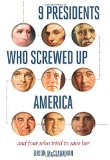 |
9 Presidents Who Screwed Up America: And Four Who Tried to Save Her
Brion McClanahan |
|
Of the forty four presidents who have led the United States, nine made mistakes that permanently scarred the nation. Which nine? Brion McClanahan,
author of The Politically Incorrect Guide to the Founding Fathers and The Founding Fathers' Guide to the Constitution, will surprise readers with his list, which he
supports with exhaustive and entertaining evidence. 9 Presidents Who Screwed Up America is a new look back at American history that unabashedly places blame for our
nation's current problems on the backs of nine very flawed men.
|
|
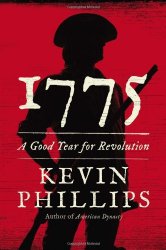 |
1775: A Good Year for Revolution
Kevin Phillips |
|
In 1775, iconoclastic historian and bestselling author Kevin Phillips punctures the myth that 1776 was the watershed year of the American
Revolution. He suggests that the great events and confrontations of 1775—Congress’s belligerent economic ultimatums to Britain, New England’s rage militaire,
the exodus of British troops and expulsion of royal governors up and down the seaboard, and the new provincial congresses and hundreds of local committees that
quickly reconstituted local authority in Patriot hands—achieved a sweeping Patriot control of territory and local government that Britain was never able to
overcome. These each added to the Revolution’s essential momentum so when the British finally attacked in great strength the following year, they could not
regain the control they had lost in 1775.
Analyzing the political climate, economic structures, and military preparations, as well as the roles of
ethnicity, religion, and class, Phillips tackles the eighteenth century with the same skill and insights he has shown in analyzing contemporary politics and
economics. The result is a dramatic narrative brimming with original insights. 1775 revolutionizes our understanding of America’s origins.
|
|
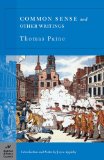 |
Common Sense and Other Writings
Thomas Paine |
|
Though he did not emigrate from England to the American colonies until 1774, just a few months before the Revolutionary War began, Thomas Paine
had an enormous impact on that war and the new nation that emerged from it. Common Sense, the instantly popular pamphlet he published in January 1776, argued that
the goal of the struggle against the British should be not simply tax reform, as many were calling for, but complete independence. His rousing, radical voice was
balanced by the equally independence-minded but more measured tones of Thomas Jefferson, who wrote the Declaration of Independence later that year.
In later
works, such as The Rights of Man, The Age of Reason, and other selections included in this volume, Paine proved himself a visionary moralist centuries ahead of his
time. He believed that every human has the natural right to life’s necessities and that government’s role should be to provide for those in dire need. An impassioned
opponent of all forms of slavery, he understood that no one in poverty is truly free, a lesson still to be learned by many of our leaders today.
|
|
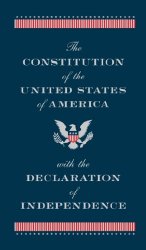 |
The Constitution of the United States of America with the Declaration of Independence
Barnes & Noble (Editor) |
|
Elegantly designed, The Constitution of the United States of America with the Declaration of Independence puts indispensible documents of
America's heritage in the palm of your hand. This portable, pocket-sized volume includes the full text of the Declaration of Independence, the Constitution of the
United States of America, and the twenty-seven amendments to the Constitution. It also contains the Articles of Confederation, a chronology of the adoption and
ratification of all of these documents, an index to the Constitution and the amendments, and an introduction by Professor R. R. Bernstein. The Constitution of the
United States of America with the Declaration of Independence is one of Barnes & Noble's Leatherbound Classic Editions. It features a durable bonded-leather binding
and distinctive gilt edging.
|
|
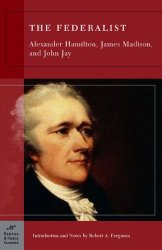 |
The Federalist
Alexander Hamilton, James Madison, John Jay |
|
A classic of American political thought, The Federalist is a series of eighty-five essays by
three authors—Alexander Hamilton, James Madison, and John Jay—the purpose of which was to gain support for the
proposed new Constitution of the United States, a document that many considered too radical. Most of the “papers”
were published in periodicals as the vote on approving it drew near. Without the support of these powerfully
persuasive essays, the Constitution most likely would not have been ratified and America might not have survived as
a nation.
Beginning with an assault upon the country’s first constitution, the Articles of Confederation, the
authors of The Federalist present a masterly defense of the new system. Hamilton, Madison, and Jay—three of our
most influential founders—comment brilliantly on issue after issue, whether it be the proper size and scope of
government, taxation, or impeachment. Today lawmakers and politicians frequently invoke these commentaries, more
than 200 years after they first appeared.
Written in haste and during a time of great crisis in the new
American government, the articles were not expected to achieve immortality. Today, however, many historians consider
The Federalist as the third most important political document in American history, just behind the Declaration of
Independence and the Constitution itself. They have become the benchmark of American political philosophy, and the
best explanation of what the Founding Fathers were trying to achieve. |
|
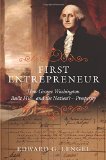 |
First Entrepreneur: How George Washington Built His--and the Nation's--Prosperity
Edward G. Lengel |
|
The United States was conceived in business, founded on business, and operated as a business—all because of the entrepreneurial mind of the
greatest American businessman of any generation: George Washington.
Using Washington's extensive but often overlooked financial papers, Edward G. Lengel
chronicles the fascinating and inspiring story of how this self-educated man built the Mount Vernon estate into a vast multilayered enterprise and prudently
managed meager resources to win the war of independence. Later, as president, he helped establish the national economy on a solid footing and favorably positioned
the nation for the Industrial Revolution. Washington's steadfast commitment to the core economic principles of probity, transparency, careful management, and
calculated boldness are timeless lessons that should inspire and instruct investors even today.
First Entrepreneur will transform how ordinary Americans
think about George Washington and how his success in commercial enterprise influenced and guided the emerging nation. |
|
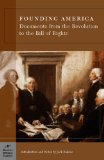 |
Founding America
Documents from the Revolution to the Bill of Rights |
|
Modern American politicians refer to “the founders” so often that they’re in danger of becoming clichés. But Benjamin Franklin, Thomas Jefferson,
Abigail and John Adams, Alexander Hamilton, George Washington, James Madison, James Monroe, and the other authors included in this new collection were a wholly
unique—and complex—group of individuals, graced with extraordinary intellectual powers, a profound dedication to their ideals, and a striking ability to articulate
those ideals in clear and passionate prose. This original anthology of their writings, many of them far less familiar to us than they should be, demonstrates the
depth of their thinking—and of their disagreements. It covers the full range of events from 1773 to 1789: that is, from the early debates about whether the North
American colonies should declare their independence from England, to the ratification of the Constitution and the first ten amendments (the Bill of Rights). Among
the documents included are papers from the first and second Continental Congresses, the Articles of Confederation, Washington’s Farewell Address to his armies, and
extensive excerpts from the Federalist papers and the Madison–Jefferson correspondence on the Constitution.
|
|
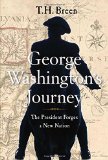 |
George Washington's Journey: The President Forges a New Nation
T.H. Breen |
|
This is George Washington in the surprising role of political strategist.
T.H. Breen introduces us to a George Washington we rarely
meet. During his first term as president, he decided that the only way to fulfill the Revolution was to take the new federal government directly to the people.
He organized an extraordinary journey carrying him to all thirteen states. It transformed American political culture.
For Washington, the stakes were high.
If the nation fragmented, as it had almost done after the war, it could never become the strong, independent nation for which he had fought. In scores of communities,
he communicated a powerful and enduring message—that America was now a nation, not a loose collection of states. And the people responded to his invitation in ways
that he could never have predicted.
|
|
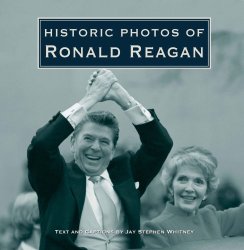 |
Historic Photos of Ronald Reagan
Jay Stephen Whitney |
|
The popularity of great Americans frequently simmers before it boils, but the nation’s 40th
President heard the kettle whistling from early in his administration. Ronald Reagan came to office in 1981
determined to face head-on foes of the great American experiment. He departed in 1989 adored by millions of
fellow citizens and admired even by political adversaries. Join Jay Stephen Whitney in this look at the life and
work of Ronald Wilson Reagan through nearly 200 large-format photographs, with introductions and captions by the
author, from Reagan’s infancy in 1911 through his youth, his career in television and film, the governorship of
California, and his rise to the presidency. Discover why the legacy of President Reagan continues to gather
momentum over twenty years after the Great Communicator left the Oval Office.
|
|
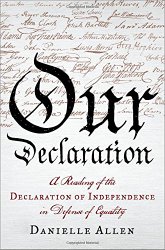 |
Our Declaration: A Reading of the Declaration of Independence in Defense of Equality
Danielle Allen |
|
In just 1,337 words, the Declaration of Independence altered the course of history. Written in 1776, it is the most profound document in the history
of government since the Magna Carta, signed nearly 800 years ago in 1215. Yet despite its paramount importance, the Declaration, curiously, is rarely read from start
to finish—much less understood. Troubled by the fact that so few Americans actually know what it says, Danielle Allen, a political philosopher renowned for her work
on justice and citizenship, set out to explore the arguments of the Declaration, reading it with both adult night students and University of Chicago undergraduates.
Keenly aware that the Declaration is riddled with contradictions—liberating some while subjugating slaves and Native Americans—Allen and her students nonetheless
came to see that the Declaration makes a coherent and riveting argument about equality. They found not a historical text that required memorization, but an animating
force that could and did transform the course of their everyday lives.
|
|
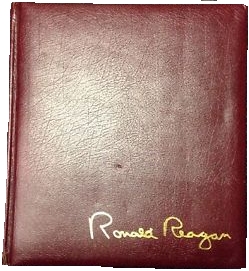 |
Ronald Reagan: An American Hero
DK Publishing, Nancy Reagan |
|
A photo essay on the life and times of America's 40th President. "He did not adjust his beliefs to conform to prevailing political winds.... Instead
he spoke directly from his heart to the hearts and minds of the American people. And, in doing so, he initiated the greatest love affair between an American President
and his constituents in recent history." -- Frederick J. Ryan, Jr., chairman of the Ronald Reagan Presidential Foundation. Even before he made the White House his
home, Ronald Reagan spoke for the American people, capturing the hearts of small-town citizens and world leaders alike. His remarkable career in public life,
spanning over fifty years, began in the Midwest, as a student leader and sports broadcaster, then in Hollywood as an actor and long-time director of the Screen
Actors Guild, later as governor of California, and finally, as president of the United States. His legacy, too, is extraordinary: In the eight short years as
president, Ronald Reagan presided over epochal international changes and ushered in unparalleled peace and prosperity--not only to his country but the world. Ronald
Reagan: An American Hero is the story of Ronald Reagan's trials and triumphs, the story of his character and vision and values. It's the love story of a man for his
wife, his country, and the world--the story of his unquenchable passion for liberty and life itself. Over 500 archival and full-color images, including many
never-before-published photographs from Nancy Reagan's private collection and the Ronald Reagan Presidential Library and Museum, chronicle the milestones of
America's fortieth president. Punctuating this visual history are close to 200 quotes from world leaders, actors, journalists, family, and friends who bear
testimony to the greatness of the man who, for millions, has become an enduring American hero. |
|
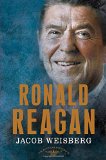 |
Ronald Reagan: The American Presidents Series: The 40th President, 1981-1989
Jacob Weisberg |
|
The conservative icon who reshaped American politics and laid the groundwork for the end of the Cold War.
In the second half of the
twentieth century, no American president defined his political era as did Ronald Reagan. He ushered in an age that extolled smaller government, tax cuts, and
strong defense, and to this day politicians of both political parties operate within the parameters of the world he made. His eight years in office from 1981
to 1989 were a time of economic crisis and recovery, a new American assertiveness abroad, and an engagement with the Soviet Union that began in conflict but moved
in surprising new directions.
Jacob Weisberg provides a bracing portrait of America's fortieth president and the ideas that animated his political career,
offering a fresh psychological interpretation and showing that there was more to Reagan than the usual stereotypes. Reagan, he observes, was a staunch conservative
but was also unafraid to compromise and cut deals where necessary. And Reagan espoused a firm belief, just as firm as his belief in small government and strong
defense, that nuclear weapons were immoral and ought to be eliminated. Weisberg argues that these facets of Reagan were too often ignored in his time but reveal
why his presidency turned out to be so consequential.
In the years since Reagan left office, he has been cast in marble by the Republican Party and dismissed
by the Democrats. Weisberg shows why we need to move past these responses if we wish truly to appreciate his accomplishments and his legacy. |
|
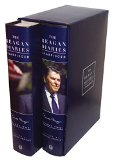 |
The Reagan Diaries Unabridged
Ronald Reagan |
|
During his two terms as the fortieth president of the United States, Ronald Reagan kept a daily diary in which he recorded, by hand, his innermost
thoughts and observations on the extraordinary, the historic, and the routine day-to-day occurrences of his presidency. Now, nearly two decades after he left office,
this remarkable record—the only daily presidential diary in American history—is available for the first time.
Brought together in one volume and edited by
historian Douglas Brinkley, The Reagan Diaries provides a striking insight into one of this nation's most important presidencies and sheds new light on the character
of a true American leader. Whether he was in his White House residence study or aboard Air Force One, each night Reagan wrote about the events of his day, which often
included his relationships with other world leaders Mikhail Gorbachev, Pope John Paul II, Mohammar al-Qaddafi, and Margaret Thatcher, among others, and the
unforgettable moments that defined the era—from his first inauguration to the end of the Cold War, the Iran hostage crisis to John Hinckley Jr.'s assassination
attempt.
The Reagan Diaries reveals more than just Reagan's political experiences: many entries are concerned with the president's private thoughts and
feelings—his love and devotion for Nancy Reagan and their family, his belief in God and the power of prayer. Seldom before has the American public been given access
to the unfiltered experiences and opinions of a president in his own words, from Reagan's description of near-drowning at the home of Hollywood friend Claudette
Colbert to his determination to fight Fidel Castro at every turn and keep the Caribbean Sea from becoming a "Red Lake."
To read these diaries—filled with
Reagan's trademark wit, sharp intelligence, and humor—is to gain a unique understanding of one of the most beloved occupants of the Oval Office in our nation's
history. |
|
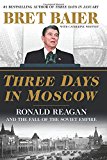 |
Three Days in Moscow: Ronald Reagan and the Fall of the Soviet Empire
Bret Baier |
|
Moscow, 1988: 1,000 miles behind the Iron Curtain, Ronald Reagan stood for freedom and confronted the Soviet empire.
In his acclaimed
bestseller Three Days in January, Bret Baier illuminated the extraordinary leadership of President Dwight Eisenhower at the dawn of the Cold War. Now in his
highly anticipated new history, Three Days in Moscow, Baier explores the dramatic endgame of America’s long struggle with the Soviet Union and President Ronald
Reagan’s central role in shaping the world we live in today.
On May 31, 1988, Reagan stood on Russian soil and addressed a packed audience at Moscow
State University, delivering a remarkable—yet now largely forgotten—speech that capped his first visit to the Soviet capital. This fourth in a series of
summits between Reagan and Soviet General Secretary Mikhail Gorbachev, was a dramatic coda to their tireless efforts to reduce the nuclear threat. More than
that, Reagan viewed it as “a grand historical moment”: an opportunity to light a path for the Soviet people—toward freedom, human rights, and a future he
told them they could embrace if they chose. It was the first time an American president had given an address about human rights on Russian soil. Reagan had
once called the Soviet Union an “evil empire.” Now, saying that depiction was from “another time,” he beckoned the Soviets to join him in a new vision of
the future. The importance of Reagan’s Moscow speech was largely overlooked at the time, but the new world he spoke of was fast approaching; the following
year, in November 1989, the Berlin Wall fell and the Soviet Union began to disintegrate, leaving the United States the sole superpower on the world
stage.
Today, the end of the Cold War is perhaps the defining historical moment of the past half century, and must be understood if we are to make
sense of America’s current place in the world, amid the re-emergence of US-Russian tensions during Vladimir Putin’s tenure. Using Reagan’s three days in
Moscow to tell the larger story of the president’s critical and often misunderstood role in orchestrating a successful, peaceful ending to the Cold War,
Baier illuminates the character of one of our nation’s most venerated leaders—and reveals the unique qualities that allowed him to succeed in forming an
alliance for peace with the Soviet Union, when his predecessors had fallen short. |
|
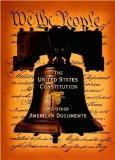 |
The United States Constitution and Other American Documents
Fall River Press |
|
This book combines the Declaration of Independence, the Articles of Confederation and the
Constitution with the revolutionary pamphlet Common Sense written by Thomas Paine.
|
|
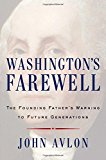 |
Washington's Farewell: The Founding Father’s Warning to Future Generations
John Avlon |
|
George Washington’s Farewell Address was a prophetic letter from a “parting friend” to his fellow citizens about the forces he
feared could destroy our democracy: hyper-partisanship, excessive debt, and foreign wars.
Once celebrated as civic scripture, more widely
reprinted than the Declaration of Independence, the Farewell Address is now almost forgotten. Its message remains starkly relevant. In Washington’s
Farewell, John Avlon offers a stunning portrait of our first president and his battle to save America from self-destruction.
At the end of
his second term, Washington surprised Americans by publishing his Farewell message in a newspaper. The President called for unity among “citizens
by birth or choice,” advocated moderation, defended religious pluralism, proposed a foreign policy of independence (not isolation), and proposed
that education is essential to democracy. He established the precedent for the peaceful transfer of power.
Washington’s urgent message was
adopted by Jefferson after years of opposition and quoted by Lincoln in defense of the Union. Woodrow Wilson invoked it for nation-building; Eisenhower
for Cold War; Reagan for religion. Now the Farewell Address may inspire a new generation to re-center our politics and reunite our nation through
the lessons rooted in Washington’s experience. |
|
|

